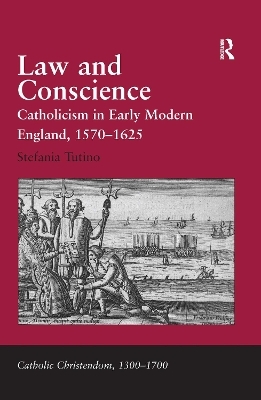
Law and Conscience
Catholicism in Early Modern England, 1570–1625
Seiten
2007
Routledge (Verlag)
978-0-7546-5771-2 (ISBN)
Routledge (Verlag)
978-0-7546-5771-2 (ISBN)
Examines the Catholic elaboration on the relationship between state and Church in late Elizabethan and Jacobean England. This book presents elements which are crucial to understanding the problems at stake, from both a political and a religious point of view.
This book examines the Catholic elaboration on the relationship between state and Church in late Elizabethan and Jacobean England. Among the several factors which have contributed to the complex process of state-formation in early modern Europe, religious affiliation has certainly been one of the most important, if not the most important. Within the European context of the consolidation of both the nation-state entities and the state-Churches, Catholicism in England in the 16th and 17th centuries presents peculiar elements which are crucial to understanding the problems at stake, from both a political and a religious point of view. Catholics in early modern England were certainly a minority, but a minority of an interestingly doubled kind. On the one hand, they were a "sect" among many others. On the other hand, Catholicism was a "universal", catholic religion, in a country in which the sovereign was the head - or governor - of both political and ecclesiastical establishments. In this context, this monograph casts light on the mechanisms through which a distinctive religious minority was able to adapt itself within a singular political context. In the most general terms, this book contributes to the significant question of how different religious affiliations could (or might) be integrated within one national reality, and how political allegiance and religious belief began to be perceived as two different identities within one context. Current scholarship on the religious history of early modern England has considerably changed the way in which historians think about English Protestantism. Recent works have offered a more nuanced and accurate picture of the English Protestant Church, which is now seen not as a monolithic institution, but rather as complex and fluid. This book seeks to offer certain elements of a complementary view of the English Catholic Church as an organism within which the debate over how to combine the catholic feature of the Church of Ro
This book examines the Catholic elaboration on the relationship between state and Church in late Elizabethan and Jacobean England. Among the several factors which have contributed to the complex process of state-formation in early modern Europe, religious affiliation has certainly been one of the most important, if not the most important. Within the European context of the consolidation of both the nation-state entities and the state-Churches, Catholicism in England in the 16th and 17th centuries presents peculiar elements which are crucial to understanding the problems at stake, from both a political and a religious point of view. Catholics in early modern England were certainly a minority, but a minority of an interestingly doubled kind. On the one hand, they were a "sect" among many others. On the other hand, Catholicism was a "universal", catholic religion, in a country in which the sovereign was the head - or governor - of both political and ecclesiastical establishments. In this context, this monograph casts light on the mechanisms through which a distinctive religious minority was able to adapt itself within a singular political context. In the most general terms, this book contributes to the significant question of how different religious affiliations could (or might) be integrated within one national reality, and how political allegiance and religious belief began to be perceived as two different identities within one context. Current scholarship on the religious history of early modern England has considerably changed the way in which historians think about English Protestantism. Recent works have offered a more nuanced and accurate picture of the English Protestant Church, which is now seen not as a monolithic institution, but rather as complex and fluid. This book seeks to offer certain elements of a complementary view of the English Catholic Church as an organism within which the debate over how to combine the catholic feature of the Church of Ro
Stefania Tutino is Professor in the Department of History, University of California - Santa Barbara, USA.
Contents: Series editor's preface; Introduction; The debate before and after the excommunication; The political significance of the first mission of the Society of Jesus to England; Old ideas and new interpretations at the end of Elizabeth's reign; 'Smile (Muses) smile! A noble one succeeds/ Eliza lawfull heire in vertuous deedes': the ascent of James Stuart; The Oath of Allegiance; Bellarmine's solution; A change in the political debate; A change in the theological debate; Conclusions; Selected bibliography; Index.
| Erscheint lt. Verlag | 28.8.2007 |
|---|---|
| Reihe/Serie | Catholic Christendom, 1300-1700 |
| Verlagsort | London |
| Sprache | englisch |
| Maße | 156 x 234 mm |
| Gewicht | 544 g |
| Themenwelt | Geschichte ► Allgemeine Geschichte ► Neuzeit (bis 1918) |
| Geisteswissenschaften ► Geschichte ► Regional- / Ländergeschichte | |
| Geschichte ► Teilgebiete der Geschichte ► Religionsgeschichte | |
| ISBN-10 | 0-7546-5771-X / 075465771X |
| ISBN-13 | 978-0-7546-5771-2 / 9780754657712 |
| Zustand | Neuware |
| Haben Sie eine Frage zum Produkt? |
Mehr entdecken
aus dem Bereich
aus dem Bereich
Europa 1848/49 und der Kampf für eine neue Welt
Buch | Hardcover (2023)
DVA (Verlag)
CHF 67,20
Giordano Bruno - ein ketzerisches Leben
Buch | Hardcover (2024)
C.H.Beck (Verlag)
CHF 41,85


